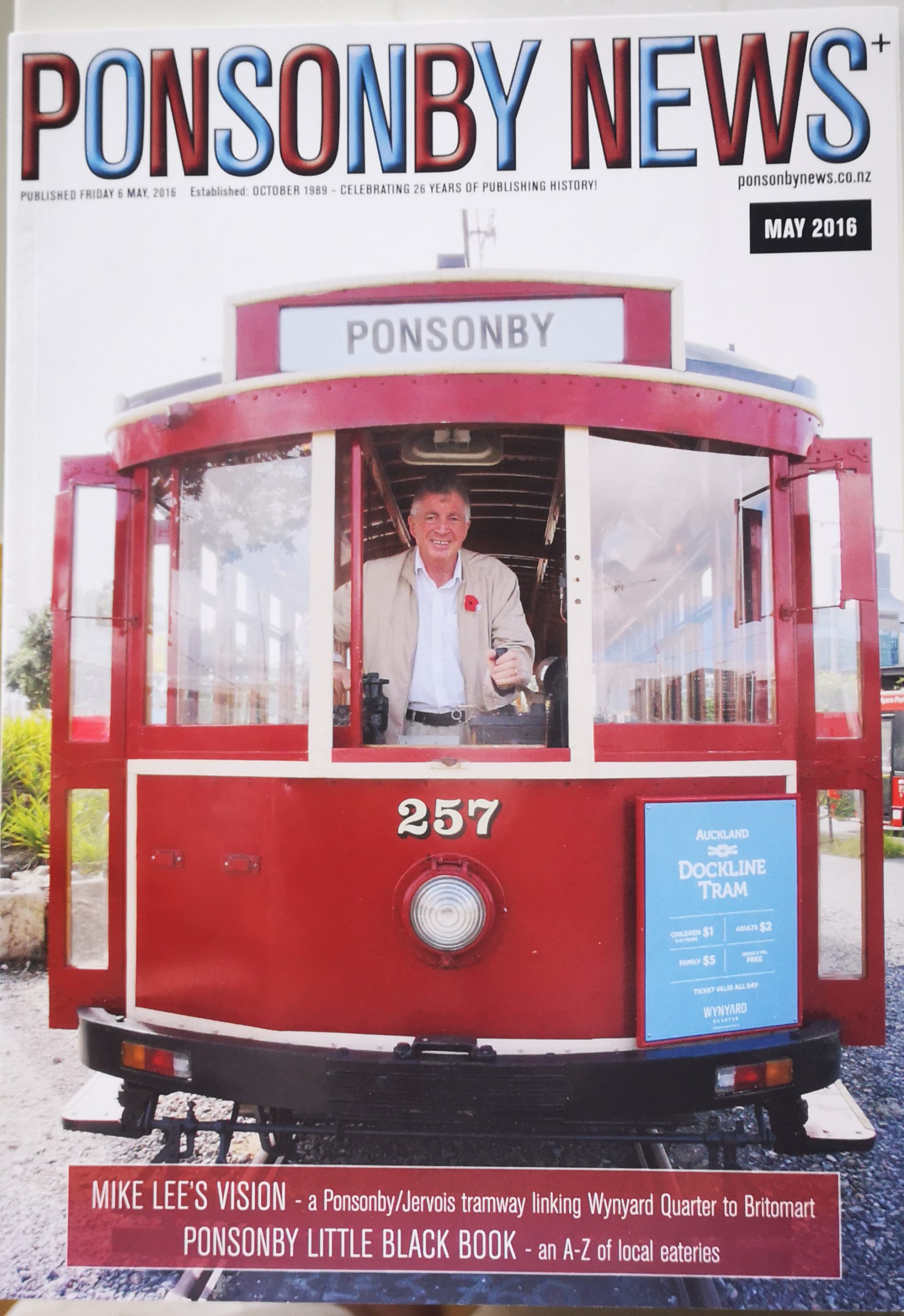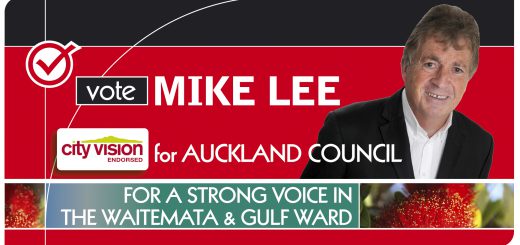Waitemata & Gulf vote not to be taken for granted
My heartfelt thanks to the voters of Waitemata & Gulf for giving me a decisive 1000 plus majority for another term on Auckland Council. It was a hard campaign against a well-funded, high-profile opponent in Bill Ralston backed by the National Party.
I was also very pleased to see the City Vision Waitemata Local Board candidates do so well in their contest with National’s Auckland Future. The return of board chair Shale Chambers, deputy Pippa Coom and talented Vernon Tava is a testament to their hard work and newly-elected young Adriana Christie has a great future. I was sorry to see old warhorse Greg Moyle miss out but Auckland Future’s Mark Davey will add value and blue-green Rob Thomas who raises his profile by also standing for council retains his position.
On Waiheke may I extend warm congratulations to hardworking board chair Paul Walden, John Meeuwsen and Shirin Brown for their deserved re-election and to newly-elected Board members Bob Upchurch and Cath Handley. I believe Bob and Cath both bring competencies which will certainly add value to the Board.
It is a critical time for Waiheke. I have good reason to believe that with a new mayor and the concurrent Local Government Commission process (which by the way is taking the Our Waiheke application seriously) the door is open for a renegotiation of the Super City arrangements for Waiheke, at the very least. At the same time the unilateral ‘out of scope’ abolition of Waiheke’s Rural Urban Boundary imposed by Council officers is being appealed before the High Court by local residents led by Paul Walden. The Council officers applied and failed for the right to sue the community for costs in this appeal. The RUB case is just another example of Auckland Council’s overbearing attitude towards Waiheke. This needs to change. The same goes with the CCOs. Auckland Transport in particular has an enormous influence on our transport links and to a remarkable degree what happens on the island – and yet I have found its management too often unresponsive to reasonable requests made on behalf of the community by both myself and the Local Board. Parking at Matiatia (both free and paid) needs to be expanded to meet demand, and it is totally unacceptable that the ratepayers of Marine View Road are told that AT (with an annual budget of $1billion) will never be able to seal their street.
All of these matters are inter-related and interlinked. Over the next few weeks and months in particular, the councillor, the Local Board and the community need to work together, presenting a solid front in the best interests of ‘Waiheke Inc’ to ensure the island gets the best possible deal. While the positions on the new Local Board are entirely a matter for the elected Local Board members, may I make the point that continuity of political leadership would be enormously helpful for the interests of Waiheke Island at this critical time.
Congratulations to Great Barrier’s returning board chair Izzy Fordham, deputy Sue Daly and member Jeff Cleave and new members Luke Coles and Shirley Johnson. Great Barrier is currently an island of political stability. In terms of voting the Great Barrier people have the best voter participation rate in the Auckland region, probably in the country – yet, by universal agreement, they put up no elections signs nor hold no election meetings. Great Barrier people know their candidates very well and vote accordingly.
Voting was up compared to 2013’s hopeless 35.5% but the average turnout across Auckland was still only 38.5% (though 41.7% for Waitemata, 59.8% for Waiheke & for 71.5% Great Barrier).
Part of this is due to the age-old problem that many people find local government dull. In 1988-89 postal voting was introduced in an effort to get participation up. It worked – for a time but now we need to look at the whole system again.
There are two elements to this problem. One is the undeniable fact that people are aware that much of the power in local government is in the hands of un-elected officers. Many feel that whichever way they vote this will not change – when in fact it must change! Despite the best intentions of the reformers of the 1980s to get the voting rate up, other reforms, especially legislation empowering council CEOs (formerly town clerks) and de-powering the role of elected councillors (what Professor Richard Mulgan called ‘Rogerpolitics’), actually worked to turn-off democratic participation.
Leaving all that to one side, City Vision is urging a return to election-day voting. While worth considering I believe quite a lot could be done to improve the present system. Auckland Council officers were so concerned at the low turn-out in 2013 that this year they spent a lot of money ($1.2m) to do something about it. Typically, they chose a PR campaign based on the theme of love, beating hearts and ‘love bus’ – (a somewhat implausible association with local government) but with little focus on the practical aspects of postal voting. Yet a key change since the 1980s is the retrenchment in postal services. As one voter reminded me, even finding a letterbox nowadays can be a mission. I was also dismayed at the chilling effect of statements from council that Wednesday 5 October was the last day a vote could be posted and arrive in time to be counted (though you could take it to a library). Why votes can be apparently collected from far-flung suburban libraries up to the Saturday but our specialised mail agency NZ Post takes more than 2 days to transport a voting envelope a few kilometres across town is a mystery. Given the closeness of the local board race the 180 Grey Lynn votes that inexplicably just did not turn up were also significant.
Rather than spending over a million dollars on PR why didn’t the council talk to NZ Post (pay them if necessary) to organise a special Saturday morning collection? Why not employ new technologies to boost postal voting. While any IT specialist will tell you internet voting is presently just too difficult to secure from hacking, other media could be tried including automated emails, phone messages and texts reminding voters to vote until the voting papers are received and scanned on a daily basis.
Returning to politics, a disappointed Bill Ralston complained to the media that despite a determined effort by the National machine to get the vote out ‘people on the right of the political spectrum just don’t vote’. Actually they do and they did. It is a mistake to assume that people in this most sophisticated of electorates always vote the party line or the same way for local government as they do in parliamentary elections. To make the point I give the last word to Ponsonby resident of centre-right persuasion (I won’t include a name) but the email message is clear.
“Hello Mike.
I was VERY pleased to see that you had been re-elected to council (I hope my vote just added to the “avalanche!).
I voted for you because you listen and react to “the voice of the people”, and that is how democracy really works.
You must (and should be) very proud that when there is a wave of “chuck the bums out” sentiment, you have stood up, been proud of your achievements and stood for re-election based upon the voice of the people.
I am very pleased for you, AND for Auckland, to see your fine results.
I look forward to seeing your sage contribution (especially as far as Rail to the airport is concerned and perhaps the new rail network to the Shore) continue in this new term.
I am delighted for you personally Mike, but also for Auckland, as I see you as a “light in the tunnel” when it comes to the council finally getting control of the bureaucrats who think that THEY are running Auckland (when in fact they need to listen to what the punters are saying and THEN make their decisions!).
Well done you.”




